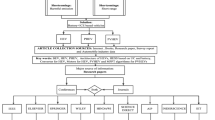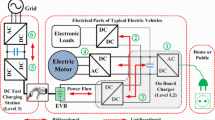Abstract
In this paper, a system for controlling the energy flow of vehicle with multiple energy storages which are used for increasing performance and driving range is presented. For achieving maximal performance and efficiency of energy flow control, traction profile of the route is necessarily known. For observation of a traction profile, Global Navigation Satellite System is used. For energy flow control, three algorithms are presented. The first proposed algorithm uses the whole traction profile of a predetermined route by the driver so the control algorithm can decide the energy of the second energy storage efficient. The second algorithm eliminates the biggest disadvantage of predetermining route, so the algorithm uses traction profile from the memory of stored routes where the vehicle was already driven. If the route was not defined or found in memory energy of secondary energy storage, (supercapacitor) using will be based on the current of primary energy storage (batteries). For verification of proposal algorithms for control of DC/DC converter which is used for energy flow control, inverter and motor were simulated with programmable load and programmable power supply.















Similar content being viewed by others
References
Husain I (2003) Electric and hybrid vehicles—design fundamentals. CRC Press LLC, Boca Raton
Schalz E (2011) Electrical vehicle design and modeling. In: Soylu S (ed) Electric vehicles—modelling and simulations, 1st edn. Aalborg University, Aalburg, pp 1–24
Linden D, Reddy TB (1995) Handbook of batteries, 3rd edn. McGraw-Hill, New York
Al-Sakka M, Van Mierlo J, Gualous H (2011) DC/DC converters for electric vehicle. In: Soylu S (ed) Electric vehicles—modelling and simulations, 1st edn. Aalborg University, Aalborg
Dobrucky B, Kascak S, Prazenica M (2018) A novel enhanced connection of AC/AC powertrain for hev—modelling and simulation results. Adv Electr Electron Eng 16(3):253–260. https://doi.org/10.15598/aeee.v16i3.2874
Dobrucky B, Kascak S, Prazenica M, Drgona P, Pavlasek P (2018) AC/AC powertrain control under different HEV supply network. In: 12th international conference on Elektro 2018: proceedings
Dobrucky B, Kascak S, Prazenica M, Jarabicova M, Konarik R (2019) Computation and comparison power losses of three- and five-phase converters (VSI) based on datasheet characteristics. In: 23rd international conference electronics 2019: proceedings [online. IEEE, 2019. Available from: https://doi.org/10.1109/ELECTRONICS.2019.8765583
Kascak S, Prazenica M, Jarabicova M, Paskala M (2018) Interleaved dc/dc boost converter with coupled inductors. Adv Electr Electron Eng 16(2):147–154. https://doi.org/10.15598/aeee.v16i2.2413
Piriienko S, Balakhontsev A, Beshta A, Albu A, Khudoliy S (2016) Optimization of hybrid energy storage system for electric vehicles. Power Electron Drives Electron Drives. https://doi.org/10.5277/PED160206
Ogasa M, Taguchi Y (2007) Power flow control for hybrid electric vehicles using trolley power on-board batteries. QR RTRI 48(1):30–36
El Fadil H, Giri F, Guerrero JM (2012) Lyapunov based control of hybrid energy storage system inelectric vehicles. In: Proceedings of the American Control Conference (ACC), 2012 (American Control Conference), IEEE Press, Montreal, QC, pp 5005–5010
Xiaoliang H, Yoichi H, Tosiyoki H (2014) Bidirectional power flow control for battery super capacitor hybrid energy system for electric vehicles with in-wheel motors. In: 2014 16th international power electronics and motion control conference and exposition, antalya, pp 1078–1083. https://doi.org/10.1109/EPEPEMC.2014.6980652
Forestieri JN, Farasat M (2020) Energy flow control and sizing of a hybrid battery/supercapacitor storage in MVDC shipboard power systems. IET Electr Syst Transp. https://doi.org/10.1049/iet-est.2019.0161
Tan B, Tan N, Ramasamy A (2018) Design of a battery-ultracapacitor hybrid energy storage system with power flow control for an electric vehicle. Int J Power Electron Drive Syst: IJPEDS 9:286. https://doi.org/10.11591/ijpeds.v9.i1.pp286-296
Zhang L, Xia X, Barzegar F (2017) Control of a battery/supercapacitor hybrid energy storage system for electric vehicles. In: 2017 36th Chinese Control Conference (CCC), Dalian, pp 9560–9565. https://doi.org/10.23919/ChiCC.2017.8028883
Ye K, Li P, Li H (2020) Optimization of hybrid energy storage system control strategy for pure electric vehicle based on typical driving cycle. Math Probl Eng 2020: 1365195. https://doi.org/10.1155/2020/1365195
Vidhya SD, Balaji M (2019) Modelling, design and control of a light electric vehicle with hybrid energy storage system for Indian driving cycle. Meas Control. https://doi.org/10.1177/0020294019858212
Sorlei IS, Bizon N, Thounthong P, Varlam M, Carcadea E, Culcer M, Iliescu M, Racene M (2021) Fuel cell electric vehicles—a brief review of current topologies and energy management strategies. Energies 14(1):252. https://doi.org/10.3390/en14010252
Bosch Controller Area Network (CAN) (2017) Freescale Semiconductor, Inc. Version 2.0 [online]. https://www.nxp.com/docs/en/reference-manual/BCANPSV2.pdf. Accessed 2017-02-14
Introduction to the Controller Area Network (CAN) (2017) Texas instrument [online]. http://www.ti.com/lit/an/sloa101b/sloa101b.pdf. Accessed 2017-04-05
Kumar P (2013) Introduction to hybrid and electric vehicles, IIT Guwahati, web course. 08.02.2013
Abdul-Hak M, Al-Holou N, Mohammad U (2011) Predictive intelligent battery management system to enhance the performance of electric vehicle. In: Soylu S (ed) Electric vehicles—modelling and simulations, 1st edn. Aalborg University, Aalburg, pp 365–384
Abu-Sharkh S, Doerffel D (2004) Rapid test and non-linear model characterization of solid-state lithium-ion batteries. J Power Sources 130:266–274. https://doi.org/10.1016/j.jpowsour.2003.12.001
Koniar D, Hargas L, Loncova Z, Duchon F, Beno P (2016) Machine vision application in animal trajectory tracking. Comput Methods Progr Biomed 127:258–272. https://doi.org/10.1016/j.cmpb.2015.12.009
Spanik P, Hargas L, Hrianka M, Kozehuba I (2006) Application of virtual instrumentation LabVIEW for power electronic system analysis. In: 12th international power electronics and motion control conference EPE-PEMC 2006: proceedings
Acknowledgments
This research was funded by a Grant APVV-15-0571: Research of the optimum energy flow control in the electric vehicle system, APVV-17-0218: Investigation of biological tissues with electromagnetic field interaction and its application in the development of new procedures in the design of electrosurgical instruments and operational program integrated infrastructure 2014-2020 of the project: Innovative solutions for Propulsion, Power and Safety Components of Transport Vehicles, code ITMS 313011V334, co-financed by the European Regional development Fund.
Author information
Authors and Affiliations
Corresponding author
Additional information
Publisher's Note
Springer Nature remains neutral with regard to jurisdictional claims in published maps and institutional affiliations.
Rights and permissions
About this article
Cite this article
Danko, M., Hanko, B., Drgona, P. et al. Energy flow control of electric vehicle based on GNSS. Electr Eng 104, 155–163 (2022). https://doi.org/10.1007/s00202-021-01272-y
Received:
Accepted:
Published:
Issue Date:
DOI: https://doi.org/10.1007/s00202-021-01272-y




